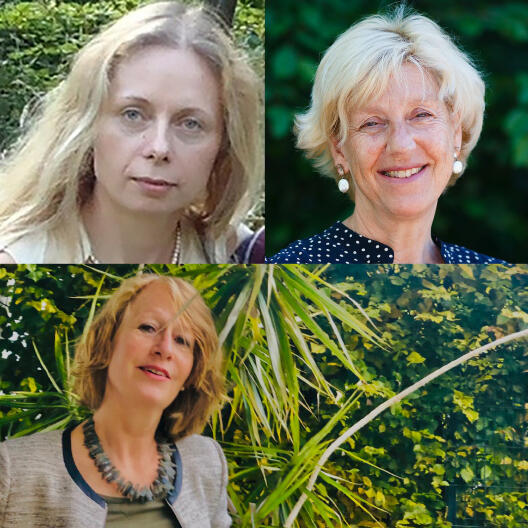New fellows in April

Four scholars will begin their work at the Kolleg on 1 April. Professor Susanne Lepsius and Professor Eva Schlotheuber each have a one-year fellowship to pursue their research projects on medieval law, and to conduct interdisciplinary exchange with the other Fellows. Dr Olga Kozubska will spend the next six months studying religious and legal plurality in late medieval and early modern towns in Ukraine.
Professor Dorothea Schulz will take up a so-called Münster Fellowship, which the Kolleg will award for the first time in the summer term of 2022. This fellowship gives researchers at the University of Münster who are working on relevant themes the opportunity for close cooperation, a one-term sabbatical financed by the University allowing them to participate intensively in the Kolleg’s work.
The new fellows at a glance:
Dr Olga Kozubska studied history at the Universities of Lviv, Budapest and Leuven. In 2004, she obtained a doctorate and took up a position as lecturer at the Ukrainian Catholic University in Lviv. In 2007, she received a second PhD from the Central European University in Budapest with a thesis on urban development and German law in Galician Rus from the 13th to the 15th century. This was followed by research stays at the Goethe University Frankfurt am Main, the Max Planck Institute for European Legal History and the Institut für vergleichende Städtegeschichte in Münster, among others. At the Käte Hamburger Kolleg, she will work on late medieval and early modern legal plurality in historical towns of Ukraine.
Prof Dr Susanne Lepsius is professor of learned law, German and European legal history and civil law at the LMU Munich. She studied law and history at the universities of Heidelberg, Chicago, and Frankfurt am Main. She held research and teaching positions at the Max Planck Institute of European Legal History and the University of Frankfurt. Her research interests focus on the field of the European ius commune tradition, courts and procedure in the medieval Italian city republics and the historiography of law. Currently she is a principal investigator in the Collaborative Research Centre SFB 1369 with a project on cultures of vigilance in late medieval and early modern cities. At the Käte Hamburger Kolleg, she will work on the book project “Law in the Middle Ages”.
Prof Dr Eva Schlotheuber studied at the universities of Göttingen and Copenhagen and earned her doctorate in Göttingen in 1994. From 1999 to 2007, she worked as a research assistant at the University of Braunschweig and at the LMU Munich, where she was habilitated in 2003 with a thesis on a convent diary of a late medieval Cistercian. In 2007, she was appointed professor of medieval history and auxiliary sciences at the University of Münster. Since 2010, she has held the Chair of Medieval History at the University of Düsseldorf. From 2016 to 2021, she served as president of the Verband der Historiker und Historikerinnen Deutschlands (German Association of Historians). At the Käte Hamburger Kolleg, she will work on the project „The Golden Bull of 1356 - the First Written Constitution of the Holy Roman Empire“.
Prof Dr Dorothea Schulz has been professor of anthropology at the University of Münster since 2018. After studying anthropology, sociology and biology in Mainz and completing her doctorate at Yale University, she took up a position as a research assistant at the Frobenius Institute in Frankfurt am Main in 1996 and a year later at Freie Universität Berlin, where in 2005 she completed her postdoctoral studies with a thesis on religiosity in Mali. She was then appointed to an assistant professorship at Indiana University in Bloomington, USA, and a professorship at the University of Cologne. Her research interests include the anthropology of religion and media, as well as anthropological gender studies. At the Kolleg, she will be working on religious plurality under the legal-institutional parameters of the postcolonial state in modern Uganda.
We wish all new fellows a good start and look forward to stimulating collaborations.

